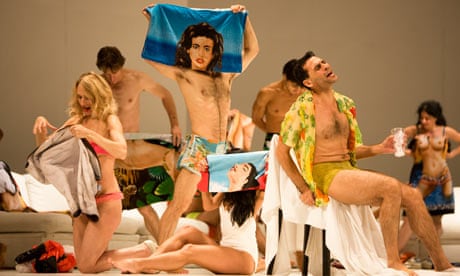In the last two decades of her career, Pina Bausch's work acquired a global dimension as her company travelled on a series of creative residences around the world. New productions were saturated with the colours and cultures of the countries they had visited, and none more so than Agua. Created after a 2001 trip to Brazil, it's arguably the most luminous, sexy, entertaining piece Bausch made.
From the moment the curtain opens we're immersed in a full on, holiday fantasy of Brazil, with beaches and cocktail lounges, hot nights and lush vegetation. Footage of the Brazilian landscape is projected on to the stage with a dizzying, whooshing intensity: close-ups of sky and waving palms, tracking shots through the rainforest. The sounds of Brazil dominate the music, and the choreography is inflected with syncopated rhythms and flirty hips.
The most startlingly pleasurable aspect of the work is that while it delves deep into the absurdities of dreams and follies, the effect is far less harrowing than in other Bausch productions. The comedy is light. When Cristiana Morganti neurotically rejects the compliments of her adoring lover, we laugh at the ridiculous idea she has of her own shortcomings. When Julie Shanahan fails to live out her dream of glamour, her disappointment modulates into a drunken larkiness as she trails off stage, falling off her high heels and toasting herself with a glass.
The work's pleasure is clinched by the fact that there is more full-bodied, joyous dancing in Agua than we're used to from Bausch – dancing that allows the 24 men and women a deliciously exuberant, untrammelled ease of self-expression.
The downside is that there is simply too much of it. A couple of the dance solos are redundant, a couple of the episodes feel like repetition. Yet if the sweet, laid-back drift of Agua has its moments of self indulgence, it can still dazzle with Bausch's genius for editing and timing. The handling of scale is masterly: a lovers' chase can expand into a ferocious group bacchanale in a second; a stageful of violent emotion can be dissipated with a single dancer's shrug. And, as in all of Bausch's work, nothing is simple. Agua closes on a childish game of water fights, with the dancers frolicking on a soaking stage. Behind them plays footage of the Iguassu falls, whose monumental force helps amplify the dancers' ecstasy. Yet it also carries the threat of death. The world is dangerous and while Bausch takes her company on a paradise vacation, we're never allowed to forget that paradise is a fragile construct.

Comments (…)
Sign in or create your Guardian account to join the discussion